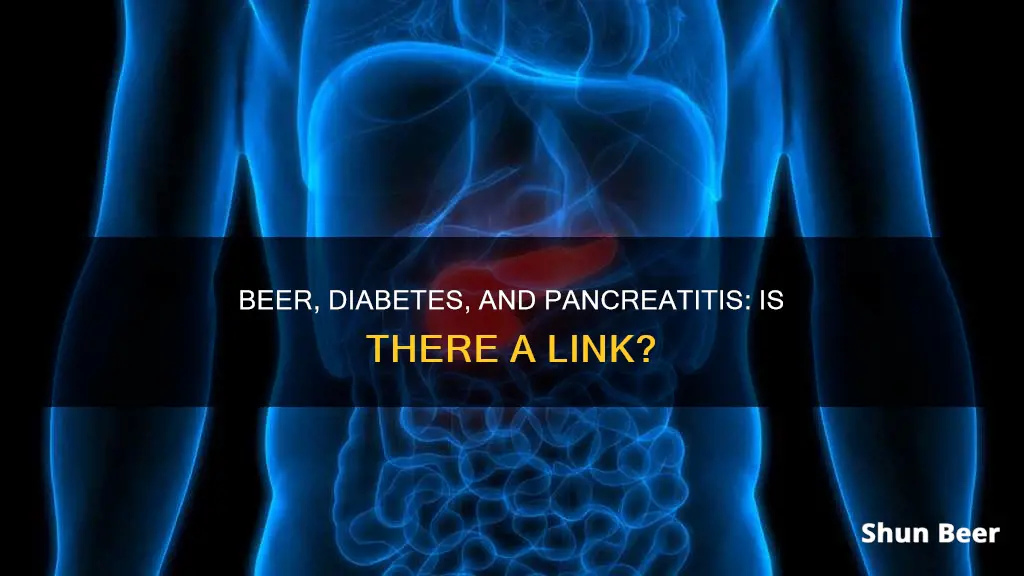
Alcohol consumption is a leading risk factor for death and disability globally, and the pancreas is one of the most important organs adversely affected by it. Alcohol abuse and pancreatic injury have been linked since 1878, and excessive alcohol intake is associated with pancreatic damage. The inflammation of the pancreas is called pancreatitis, and it can appear in acute (short-term) and chronic (long-term) forms. While acute pancreatitis goes away in a few days with appropriate medical care, the chronic form lingers and gradually worsens, eventually interfering with normal pancreas function.
Gallstones are the most common cause of acute pancreatitis, but many cases also develop due to ongoing heavy drinking. The typical cause of chronic pancreatitis is a pattern of heavy drinking that remains in effect for years or decades. In some cases, a bout of acute pancreatitis can also lead to chronic problems in the gland.
Excessive consumption of any alcoholic beverage can promote the onset of pancreatitis, but beer appears to be the most dangerous form of alcohol for the pancreas. That's because, unlike other forms of alcohol, beer directly encourages the release of chemicals called enzymes inside the pancreas. In turn, the elevated presence of these enzymes increases the odds that the gland will become inflamed.
The more alcohol you drink, either regularly or during a binge session, the greater your risk of developing acute pancreatitis. Heavy drinking and acute pancreatitis can lead to repeated episodes of acute pancreatitis, which can permanently damage your pancreas, leading to chronic pancreatitis.
However, non-alcoholic beer contains substances that may reduce the risks for pancreas inflammation. These substances have the ability to protect your pancreas from the development of serious inflammation by interfering with the release of pancreatic enzymes and combating the effects of a cell-damaging process called oxidative stress.
| Characteristics | Values |
|---|---|
| What is pancreatitis? | Inflammation of the pancreas |
| What does the pancreas do? | Produces digestive enzymes and hormones, including insulin |
| What are the types of pancreatitis? | Acute (short-term) and chronic (long-term) |
| What are the symptoms of acute pancreatitis? | Severe, dull pain around the stomach, nausea, feeling or being sick, diarrhoea, high temperature |
| What are the symptoms of chronic pancreatitis? | Repeated episodes of severe abdominal pain, greasy/floating/foul-smelling bowel motions, yellowing of eyes and skin (jaundice) |
| What are the causes of acute pancreatitis? | Gallstones, alcohol use, and several less common causes |
| What are the causes of chronic pancreatitis? | Heavy drinking, smoking, genetic and autoimmune disorders |
| What is the relationship between alcohol and pancreatitis? | Alcohol is an important cause of pancreatitis, especially chronic cases |
| What is the relationship between beer and pancreatitis? | Beer directly encourages the release of enzymes in the pancreas, increasing the risk of inflammation |
| What is the relationship between non-alcoholic beer and pancreatitis? | Non-alcoholic beer contains substances that may reduce the risk of inflammation |
What You'll Learn
- Beer stimulates the release of pancreatic enzymes, which can cause inflammation
- Alcohol abuse should be treated before it causes irreparable damage to the pancreas
- Non-alcoholic beer contains substances that may reduce the risk of pancreatitis
- Heavy drinking increases the risk of developing chronic pancreatitis
- Abstinence from alcohol is recommended for all patients to prevent disease recurrences and progression

Beer stimulates the release of pancreatic enzymes, which can cause inflammation
The pancreas is a small but important organ located behind the stomach. It produces enzymes to break down food in the gut and hormones that are involved in metabolism, including insulin, which regulates blood sugar levels. Pancreatitis is the medical term for inflammation of the pancreas. It can appear in an acute (short-term) form, as well as a chronic (long-term) form. Acute pancreatitis develops rapidly and goes away in a few days if appropriate medical care is received. However, the chronic form lingers, gradually worsens, and eventually interferes with normal pancreas function.
The release of pancreatic enzymes is stimulated by beer, and this effect is at least partially mediated by direct action on pancreatic acinar cells. Beer contains thousands of non-alcoholic compounds, and some of these have been shown to be biologically active. The non-alcoholic compounds of beer, such as quercetin, resveratrol, ellagic acid, or catechins, have been shown to be protective against experimentally induced pancreatitis by inhibiting pancreatic secretion, stellate cell activation, or by reducing oxidative stress. However, beer contains many more non-alcoholic ingredients, and their relevance in beer-induced functional alterations of pancreatic cells leading to pancreatitis needs to be further evaluated.
The amount and duration of alcohol consumption is the most important factor in increasing the risk of pancreatitis. Clinical pancreatitis develops in around 5% of individuals who drink heavily. Consumption of four to five drinks per day increases the risk of developing pancreatitis. Regular consumption of alcohol at lower levels is likely a co-factor in disease development.
The risk of pancreatitis is greater with current smoking and the amount of smoking. While studies have primarily evaluated the relationship with cigarette smoking, it is reasonable to assume that the effects of smoking apply to all forms of tobacco exposure.
Does Helium-Infused Beer Really Work?
You may want to see also

Alcohol abuse should be treated before it causes irreparable damage to the pancreas
Alcohol abuse is a leading cause of acute and chronic pancreatitis, with chronic alcohol consumption causing 17% to 25% of acute pancreatitis cases and up to 70% of chronic pancreatitis cases worldwide. Alcohol is the second most common cause of acute pancreatitis after gallstones.
The amount and duration of alcohol consumption is the most important factor in increasing the risk of pancreatitis. Clinical pancreatitis develops in around 5% of individuals who drink heavily.
Alcohol abuse can cause irreversible damage to the pancreas, and alcohol-induced pancreatitis can be fatal. Abstinence from alcohol has been shown to slow the rate of progression of the disease and decrease the severity of abdominal pain.
Alcohol cessation is the most important factor in the treatment of alcohol-induced pancreatitis. Brief alcohol intervention during hospital admission or repeated counselling at primary care or gastroenterology clinic appointments has been shown to decrease alcohol use, hospital admissions for recurrent attacks, and the development of chronic pancreatitis.
Drinking Beer While Taking Cardizem and Ceftin: What's the Verdict?
You may want to see also

Non-alcoholic beer contains substances that may reduce the risk of pancreatitis
Quercetin, ellagic acid, and resveratrol also show anti-carcinogenic potential in vitro and in vivo. However, beer contains thousands of other substances, and researchers are yet to identify all of them. Therefore, the best non-alcoholic beer for reducing the risk of pancreatitis is yet to be determined.
Exploring Salt Springs Recreation Area with a Beer
You may want to see also

Heavy drinking increases the risk of developing chronic pancreatitis
Heavy drinking is a well-known risk factor for developing chronic pancreatitis. Alcohol is the most common cause of chronic pancreatitis, and the risk of developing the disease increases with the amount of alcohol consumed. The threshold between alcohol consumption and pancreatitis is typically considered to be 4 drinks daily, with clinical studies showing that drinking more than 50-80 grams of alcohol per day is associated with alcoholic chronic pancreatitis.
The relationship between alcohol and pancreatitis has been recognized for a long time, with an association between alcohol abuse and pancreatic injury reported as early as 1878. However, it is important to note that not all heavy drinkers will develop pancreatitis, as other factors such as smoking, diet, and genetic predispositions also play a role.
The mechanism by which alcohol causes pancreatitis is not yet fully understood. One theory suggests that alcohol molecules interfere with the cells of the pancreas, causing them to stop working properly. Another theory proposes that alcohol sensitizes the pancreas to other insults or injuries, making it more susceptible to damage. Additionally, alcohol can cause oxidative stress in the pancreas, leading to cell damage.
Chronic pancreatitis is a serious and debilitating condition that can affect both quality of life and life expectancy. It is characterized by scarring and irreversible destruction of pancreatic tissue, and the pain associated with the condition can be severe. If left untreated, chronic pancreatitis can lead to other serious illnesses, including diabetes and pancreatic cancer. Therefore, it is crucial for individuals who engage in heavy drinking to be aware of the risks associated with their alcohol consumption and to seek medical advice if they experience any symptoms of pancreatitis.
Cialis and Beer: Safe Mix or Health Risk?
You may want to see also

Abstinence from alcohol is recommended for all patients to prevent disease recurrences and progression
Alcohol consumption is a leading risk factor for death and disability globally. The pancreas is one of the most important organs adversely affected by alcohol consumption. Alcohol abuse and chronic pancreatitis have been linked since 1878.
Pancreatitis is the inflammation of the pancreas, a small, important organ located behind the stomach. It produces enzymes to break down food in the gut and hormones that regulate blood sugar levels. Pancreatitis can appear in acute (short-term) and chronic (long-term) forms. Acute pancreatitis can go away in a few days with appropriate medical care, but the chronic form lingers and interferes with normal pancreas function.
Heavy drinking is the most common cause of chronic pancreatitis, responsible for between 70-80% of cases in western Europe. The typical cause of chronic pancreatitis is a pattern of heavy drinking that remains in effect for years or decades. In some cases, a bout of acute pancreatitis can also lead to chronic problems in the gland.
The more alcohol you drink, either regularly or during a binge session, the greater your risk of developing acute pancreatitis. Heavy drinking and acute pancreatitis can lead to repeated episodes of acute pancreatitis, which can permanently damage your pancreas and lead to chronic pancreatitis.
Low-Carb Diet and Beer: Is It Possible?
You may want to see also
Frequently asked questions
Pancreatitis is the medical term for inflammation of the pancreas, a gland that supports your health by producing digestive juices and two important hormones. Unless properly treated, this inflammation can seriously damage the gland’s normal function and trigger major health complications.
Symptoms often include nausea, accompanied by pain in the upper abdomen or back. Severe cases may lead to major complications, such as infection, haemorrhage, failure of other organ systems, or fluid collection in the abdomen.
There are two types of pancreatitis: acute and chronic. Acute pancreatitis involves an abrupt onset of symptoms that can vary in severity from mild to life-threatening. Chronic pancreatitis is a smouldering, long-standing disease that continues even after resolution of the original trigger. It’s characterised by scarring and irreversible destruction of pancreatic tissue.
Gallstones are the most common cause of acute pancreatitis, followed closely by alcohol use. Unlike pancreatitis caused by gallstones, pancreatitis caused by alcohol use is the most dangerous, as it can lead to chronic pancreatitis.







